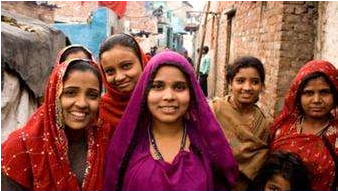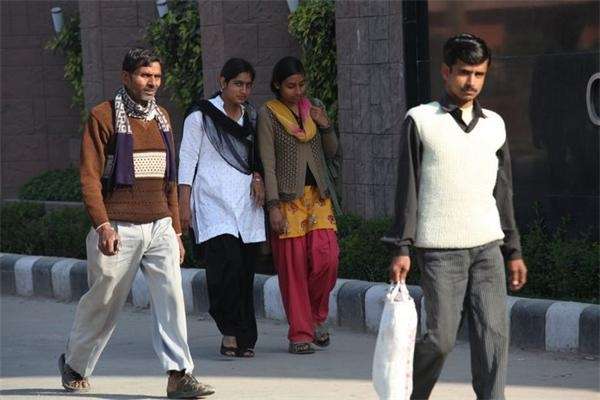India's gender chore gap, the difference between the amount of housework done by women and men, is the largest of any country for which data is available, according to new figures compiled by the World Economic Forum.India ranks top, or bottom (depending how you look at it), in terms of the number of minutes women spend on housework each day versus the amount of time men dedicate to daily household tasks
世界经济论坛显示:在印度的男女之间差距在家务劳动分配比重中得以表现,并且相对于其他国家更为严重。印度女性家务劳动比重排名世界榜首。。

Women in India on average spend 351.9 minutes every day doing housework, men spend just 51.8 minutes on such duties: a difference of 300.1 minutes. The next closest country is Mexico, with a gap of 260.7 minutes.The findings are part of the annual Global Gender Gap Report 2014 published Tuesday. This year, India fell 13 places to 114 out of 142 countries in the latest ranking, which measures equality between the sexes in access to work, education and healthcare. The fall was caused by a drop in economic participation and opportunity for women, as well as a dip in female educational attainment.
2014年全球性别差距报告指出在印度的女性平均每天花351.9分钟做家务,男人花51.8分钟工作:一共300.1分钟的差距。下一个国家是墨西哥,差距为260.7分钟。今年,在142个国家的最新排名印度13个地方降至114位,用于衡量两性平等以及获得工作,教育和医疗的权利。下降是由于印度女性经济参与度和就业机会下降,以及女性的受教育程度。
“Indian women end up doing very badly in paid work and one of the reasons for that is that they are spending so much time in unpaid work,” said Saadia Zahidi, head of the gender parity program at the WEF and one of the authors of the report.The decline in female participation in the workforce has fallen irrespective of the country's economic growth, according to a report by the International Labor Organization in February 2013.Between 2004-05 and 2009-10, a period of rapid economic growth in India, female participation in the work force fell from 37% to 29%.
“印度女性花了那么多时间在无报酬的家务劳动上所以不可能在出去找工作,”萨迪亚扎西迪说(世界经济论坛的性别平等程序主管和报告的作者之一)。女性就业的下降无关与国家的经济增长,国际劳工组织的一份报告显示。2004 - 05至2004 - 10年,印度经济快速增长的时期,女性劳动力的参与从37%降至29%。
"Women have lost out in terms of employment in the growth story," said Indrani Mazumdar, a senior fellow at the Centre for Women's Development Studies in New Delhi.In rural areas, for example, increased use of machinery in farming has led to a reduction in jobs, and the jobs that remain usually go to men, Ms. Mazumdar said.But the chore gap is most pronounced in cities, rather than villages. Among women surveyed by India's National Sample Survey Organization in 2011-12, around 39% in rural areas and about 50% in urban areas spent most of their time on domestic duties. Of those women, "about 60 per cent in rural areas and 64 per cent in urban areas did so due to the reason 'no other member to carry out the domestic duties,'" according to the survey.
“女性在经济的增长之中失败原因有很多“Indrani Mazumdar说(妇女发展研究中心高级研究员)。例如在农村地区因为增加使用机械就会导致减少就业机会,但是仍然得有人干活。所以家务差距最为明显是在城市,而不是农村。印度国家抽样调查调查的女性组织在2011 - 12,大约39%在农村地区,约50%在城市花了大部分时间浪费在家务劳动上。
Cultural taboos about female employment makes the problem more pronounced in cities, said Ranjana Kumari, author of "Gender, Work, and Power Relations," and director of New Delhi-based think tank the Centre for Social Research. "Even if women are highly educated, they aren't allowed by in-laws and husbands to do any job outside the home," Ms. Kumari said. "Women are graduating to get a good groom not a good job," she added.So what are women in India spending their time doing? The NSSO survey found that the majority spent time making cow-dung patties–used for cooking fuel–collecting firewood, sewing, tailoring, or collecting drinking water.
印度文化禁忌对城市女性就业是一个打击,Ranjana Kumari表示“如何处理好印度社会的性别、工作与权力的关系“即使是女性受过高等教育,但是公婆和丈夫不允许她们在外面做任何工作,”库玛丽女士说。“女人上大学是为了找好的新郎而不是为了找一个好工作,”她补充道。所以女性在印度花费他们的时间是在干什么?NSSO(国家样本测量组织)的调查发现,大多数花时间是把牛粪做成小馅饼样子当柴火用,还有做衣服,或者收集饮用水(河边打水)。

Urban Indian women also make cow-dung patties and walk to collect clean water, but in lower numbers. Other household chores performed by women included: fishing, grinding food grain, husking rice paddy, preserving meat and tutoring children.Solving India's shortage of power and clean water could help get more women into the workforce, said Indu Agnihotri, director of the Centre for Women's Development Studies."Women spend so much time negotiating the lack of basic civic amenities, like water and power, that even though they have a desire for work there are obstacles to getting it," Ms. Agnihotri said.
印度城市女性也把牛粪做成馅饼,或者走到河边收集干净的水,但是比较而言城市女性更喜欢去钓鱼、磨粮食,剥稻壳,保存鲜肉和辅导孩子。如果能解决印度的电力短缺和干净的水的问题可以帮助更多的女性进入职场,妇女发展研究中心主任Indu Agnihotri说。“女人花那么多时间去承受缺乏基本的市政设施,像水、电的痛苦,即使他们渴望得到一份工作也是有障碍的“Agnihotri女士说。














